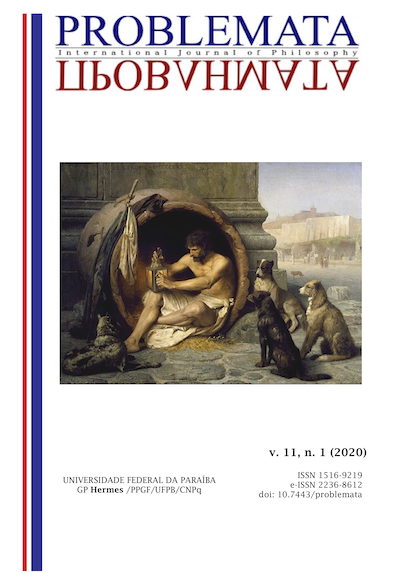THE RIGHT TO DATA PROTECTION AND ITS PROPOSAL FOR RECONCEPTUALIZATION:
A PHILOSOPHICAL APPROACH TO THE CONTEMPORARY CHALLENGES OF TECHNOLOGY
DOI:
https://doi.org/10.7443/problemata.v11i1.48827Keywords:
Data Protection, Informational Self-Determination, Philosophy of LawAbstract
This paper offers an interdisciplinary contribution to the project of reconceptualization of the right to data protection. The chosen methodology approximates the fields of Law and Philosophy in the solution of an impasse of strictly conceptual order: the theoretical framework that remains unquestioned along with the task of producing new legal categories, necessary for a satisfactory project of internet regulation.
Downloads
References
ALBERS, Marion. “Realizing the complexity of data protection”. In: GUTWIRTH, Serge; LEENES, Ronald; DE HERT, Paul (Orgs.). Reloading data protection: multidisciplinary insights and contemporary challenges. London: Springer, 2014, pp. 213-236.
______. „Informationelle Selbstbestimmung als vielschichtiges Bündel von Rechtsbindungen und Rechtspositionen“. In: FRIEDEWALD, M. et al (Orgs.). Informationelle Seblsbestimmung im digitalen Wandel. London: Springer, 2017, pp. 11-35.
CARVALHO, Orlando de. Para uma teoria da relação jurídica civil. I A teoria geral da relação jurídica – seu sentido e limites. Coimbra: Centelha, 1981.
DONEDA, Danilo. “A proteção dos dados pessoais como um direito fundamental”. Espaço Jurídico, Joaçaba, v. 12, n. 2, 2011, pp. 91-108.
DONEDA, Danilo; MENDES, Laura S. “Data protection in Brazil: new developments and current challenges”. In: GUTWIRTH, Serge; LEENES, Ronald; DE HERT, Paul (Orgs.). Reloading data protection: multidisciplinary insights and contemporary challenges. London: Springer, 2014, pp. 3-20.
FERNÁNDEZ SEGADO, Francisco. “El régimen jurídico del tratamiento automatizado de los datos de carácter personal en España”. Ius et Praxis, Talca (Chile), ano 3, n. 1, 1997, pp. 33-70.
FERREIRA FÉLIX, Flávia Alexandra. Direito a ser esquecido na internet: uma nova realidade? Dissertação (Mestrado). Faculdade de Direito da Universidade Nova de Lisboa. Lisboa, 2015.
HEIDEGGER, Martin. “A questão da técnica”. Tradução de Marco Aurélio Werle. Scientiae Studia, São Paulo, v. 5, n. 3, 2007, pp. 375-398.
LUFT, Eduardo. “Ontologia deflacionária e ética objetiva: em busca dos pressupostos ontológicos da teoria do reconhecimento”. Veritas, Porto Alegre, v. 55, n. 1, 2010, pp. 82-120.
LUCAS M. DE LA CUEVA, Pablo. “El derecho a la autodeterminación informativa y la protección de dados personales”. Azpilcueta, Donostia, n. 20, 2008, pp. 43-58.
MENDES, Marcelo D. “O marco civil da internet no Brasil: direitos, deveres e programas”. Direitos Humanos Fundamentais, Osasco, ano 15, n. 1, 2015, pp. 99-116.
RIGAUX, François. “La liberté de la vie privé”. Revue Internationale de Droit Comparé, Paris, Ano 43, n. 3, 1991, pp. 539-563.
RUARO; Regina L.; RODRIGUEZ, Daniel P.; FINGER, Brunize. “O direito à proteção de dados pessoais e a privacidade”. Revista da Faculdade de Direito UFPR, Curitiba, n. 53, 2011, pp. 45-66.
SARMENTO E CASTRO, Catarina. O direito à autodeterminação informativa e os novos desafios gerados pelo direito à liberdade e à segurança no pós 11 de Setembro. Disponível em: <http://www.estig.ipbeja.pt/~ac_direito/CatarinaCastro.pdf>. Acesso em: 18 jul. 2018.
SARLET, Ingo W. A Eficácia dos Direitos Fundamentais. 4a ed. Porto Alegre: Livraria do Advogado, 2004.
______. “Notas sobre a dignidade (da pessoa) humana no âmbito da evolução do pensamento ocidental”. Opinião Jurídica, Fortaleza, ano 13, n. 17, 2015, pp. 249-267.
SARLET, Ingo W.; MOLINARO, Carlos A. “Direito à informação e direito de acesso à informação como direitos fundamentais na Constituição Brasileira”. Revista da AGU, Brasília, ano XIII, n. 42, 2014, pp. 09-38.
SARLET, Ingo W.; RODRIGUEZ, Daniel P. “O direito fundamental à informação e um novo marco regulatório informacional”. Direitos Humanos Fundamentais, Osasco, ano 15, n. 1, 2015, pp. 81-98.
Downloads
Published
Issue
Section
License
Authors who publish with this journal agree to the following terms:
- Authors retain copyright and grant the journal right of first publication with the work simultaneously licensed under a Creative Commons Attribution License that allows others to share the work with an acknowledgement of the work's authorship and initial publication in this journal.
- Authors are able to enter into separate, additional contractual arrangements for the non-exclusive distribution of the journal's published version of the work (e.g., post it to an institutional repository or publish it in a book), with an acknowledgement of its initial publication in this journal.
-
- Authors are permitted and encouraged to post their work online (e.g., in institutional repositories or on their website) prior to and during the submission process, as it can lead to productive exchanges, as well as earlier and greater citation of published work (See The Effect of Open Access).





